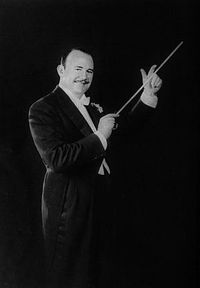
Abstract from Wikipedia : Paul Samuel Whiteman (March 28, 1890 – December 29, 1967) was an American bandleader, composer, orchestral director and violinist. Leader of one of the most popular dance bands in the United States during the 1920s and 1930s, Whiteman produced recordings that were immensely successful, and press notices often referred to him as the "King of Jazz". Using a large ensemble and exploring many styles of music, Whiteman is perhaps best known for his blending of symphonic music and jazz, as typified by his 1924 commissioning and debut of George Gershwin's jazz-influenced "Rhapsody in Blue". Later, Whiteman's work on Symphonic Jazz influenced many jazz musicians - directly or indirectly - as diverse as Miles Davis, Gil Evans, the Modern Jazz Quartet, Wynton Marsalis and other modern artists. Whiteman recorded many jazz and pop standards during his career, including "Wang Wang Blues", "Mississippi Mud", "Rhapsody in Blue", "Wonderful One", "Hot Lips (He's Got Hot Lips When He Plays Jazz)", "Mississippi Suite", "Grand Canyon Suite", and "Trav'lin' Light". He also co-wrote the 1925 jazz classic "Flamin' Mamie". His popularity faded in the swing music era of the middle 1930s, and by the 1940s Whiteman was semi-retired from music. But he experienced a revival and had a comeback in the 1950s with his own network television series on ABC, Paul Whiteman's Goodyear Revue, which ran for three seasons. He also hosted the 1954 ABC talent contest show On the Boardwalk with Paul Whiteman. Whiteman's place in the history of early jazz is somewhat controversial. Detractors suggest that Whiteman's ornately-orchestrated music was jazz in name only (lacking the genre's improvisational and emotional depth), and co-opted the innovations of black musicians. Defenders note that Whiteman's fondness for jazz was genuine (he worked with black musicians as much as was feasible during an era of racial segregation), that his bands included many of the era's most esteemed white jazz musicians, and argue that Whiteman's groups handled jazz admirably as part of a larger repertoire. In his autobiography, Duke Ellington declared, "Paul Whiteman was known as the King of Jazz, and no one as yet has come near carrying that title with more certainty and dignity." It's also likely that the term "jazz" was most loosely defined in the 1920s and probably included syncopation with some improvisation, as well as the more pure (often) African-American New Orleans, Harlem or Chicago style. Whiteman's crowning of the term "King of Jazz" was likely not meant to take anything away from the performers of the more pure jazz style.